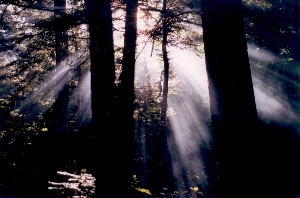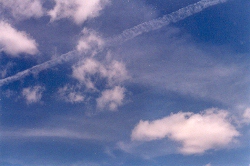 Does nature give evidence for the existence of God? Through history she has been subpoenaed for many moral and spiritual arguments. But perhaps she speaks only for herself, in finest poetry.
Does nature give evidence for the existence of God? Through history she has been subpoenaed for many moral and spiritual arguments. But perhaps she speaks only for herself, in finest poetry.This article first was first published in Living With Nature at Suite101.com on Nov. 16, 2001.
 Does nature give evidence for the existence of God? Through history she has been subpoenaed for many moral and spiritual arguments. But perhaps she speaks only for herself, in finest poetry.
Does nature give evidence for the existence of God? Through history she has been subpoenaed for many moral and spiritual arguments. But perhaps she speaks only for herself, in finest poetry.
The popular media have recently pointed toward an apparent convergence between science and religion. Modern particle physics appears to give credence to New Age explorations of quantum mysticism. Meanwhile, certain aspects of Big Bang cosmology are supposed to indicate the intervention of a supernatural intelligence. Some scientists identify so-called anthropic coincidences, aspects of our universe which make life possible and seem so remarkable that they must have been arranged intentionally.
However, this should not be seen as a widespread movement within the scientific community. As always, some scientists are believers who have interpreted new data as supporting conventional ideas. Their statements are debatable, aren't affirmed by the mainstream, and should not be viewed as a consensus.
On the contrary, as many researchers as ever assert that the universe can be explained without the need for divine intervention. In looking for a supernatural force, one would predict aberrations from natural laws. But despite the evidence we might hope to find, the net balance of energy in the cosmos appears to be near zero. Scientists have yet to detect any input at the point of origin or anywhere else. There is no clear fingerprint of God. The Big Bang was entirely within the realm of natural possibility. Life on Earth is a marvellous cosmic circumstance—a rarity perhaps, and fortunate from our perspective—but in such a vast sea of possibility, rarities occur.
One writer who has devoted much of his life work to balanced skepticism is Victor J. Stenger, professor emeritus of physics and astronomy at University of Hawaii. The sample writings on his website do not attempt to disprove the existence of God, but simply to refute unfounded claims.
On the other extreme are those who insist that God does not exist. The difficulty with metaphysical naturalism, the view that nature is a closed system with no need of explanation, is that it offers what many people will view as a sterile existence devoid of spirit. Faith has given many of us a purpose for living, a structure for compassionate society, and strength to face life's trials.
 We turn to nature to nurture this faith. Many of us have had our most meaningful spiritual experiences in relationship to the environment. Beauty provokes us to transcend our mundane concerns, shortcomings and conflicts. We have heard the voice of God in our woods and waterways, in bird song or the remarkable delicacy of a flower. We will not readily abandon the idea of a higher power, or ascribe all this complexity to the whim of chaos.
We turn to nature to nurture this faith. Many of us have had our most meaningful spiritual experiences in relationship to the environment. Beauty provokes us to transcend our mundane concerns, shortcomings and conflicts. We have heard the voice of God in our woods and waterways, in bird song or the remarkable delicacy of a flower. We will not readily abandon the idea of a higher power, or ascribe all this complexity to the whim of chaos.
Questions about the existence of God wouldn't be so polarizing if we weren't obsessed with certainty and objectivity. The ancients had to be satisfied with guesswork to figure out how the universe functioned. Anything that didn't make sense could be attributed to supernatural powers. Now we have more tools for finding real answers to questions about nature. But the spirit world eludes our finest-tuned instruments. Probably no telescope will ever reveal the face of God in a nebula or supernova, like a glimpse in a room of mirrors. Outside of our own hearts, we search in vain.
Some of the most intriguing aspects of quantum mechanics, particle physics and chaos theory seem too esoteric for the layman.
The situation is almost reminiscent of the difficulties which have always surrounded mysticism. Throughout the ages and in various cultures, mystics have explored a direct and unusual personal experience of God. This was usually deemed to require special spiritual abilities. An aspiring mystic must learn special techniques for meditation and reflection from a guru, otherwise his or her efforts could be misguided and even dangerous. Ultimately, mystics have contributed to all the major belief systems of the world. They tended to bring compassion and tolerance to the most destructive and insufferable religions. But their teachings had to filter down to the masses in a simplified form. Some of the wisdom was kept hidden. This practice was not elitist. It was necessary because not everything would be comprehensible or practical for the average person.
In our individualistic era, everyone wants the best of everything, even knowledge, and we want it quickly. Catering to this, many contemporary brands of mysticism offer little more than a quick fix, a readily marketable product. Most people are too impatient to devote their entire lives to meditation on the path to enlightenment.
The same is true of scientific truth. Few are willing to devote years to studying and contemplating the universe with an open mind. But we demand to know, we cherish our preconceived notions, and we want answers fast. The popular media and the pedagogues pander to these expectations. Awash in speculation and hyperbole, we have a hard time recognizing what's bogus. And usually we would rather dismiss any facts that threaten our familiar way of thinking.
 So how can modern science lead us closer to God? It probably can't, if we're seeking concrete spiritual facts to support certain doctrines or cosmology. We will find answers, but the best lesson we can hope to learn from gazing at the skies is one of humility and wonder. For deeper spiritual meaning, and for resolving moral and social problems, we must rely on the spirit.
So how can modern science lead us closer to God? It probably can't, if we're seeking concrete spiritual facts to support certain doctrines or cosmology. We will find answers, but the best lesson we can hope to learn from gazing at the skies is one of humility and wonder. For deeper spiritual meaning, and for resolving moral and social problems, we must rely on the spirit.
Nature in our backyards is important because it is our fragment of the cosmos, immediate, real and interactive. It can give us a personal experience of transcendence. We have its energy before our eyes, in our noses when we smell the spring mud, or between our fingers when we whittle a willow branch. It is not always the bucolic image portrayed in lovely albums of wildlife photography. Sometimes cruel and dangerous, it is yet constructive, creative, beautiful and powerful, a fitting embodiment of God. Nature's ways are worthy to inspire us. It leads us into the realm of the imagination, our inner playground and the workshop of enlightenment.
Out of nothing, through a random curve in the void, the universe erupted into startling complexity. The human mind is one more facet of this creation. Each of us, as a tiny reflection of the cosmos, is capable of creativity. Our species has sometimes proven capable of uncovering its own meaning, and we continue to work this out as we encounter new information and challenges.
This is a realm of fantasy, but is not a lie. It is the endowment of the universe to us, our privilege and responsibility as sentient beings. Here we can practice true spirituality by employing our gifts in compassionate care for one another, the creatures with which we share our planet, and our tiny home within the vast tracts of space. We can build and protect a sacred monument to the wonder of all.
All written material and images are ©1997-2002 Van Waffle. This page updated Apr. 16, 2002.
|
|